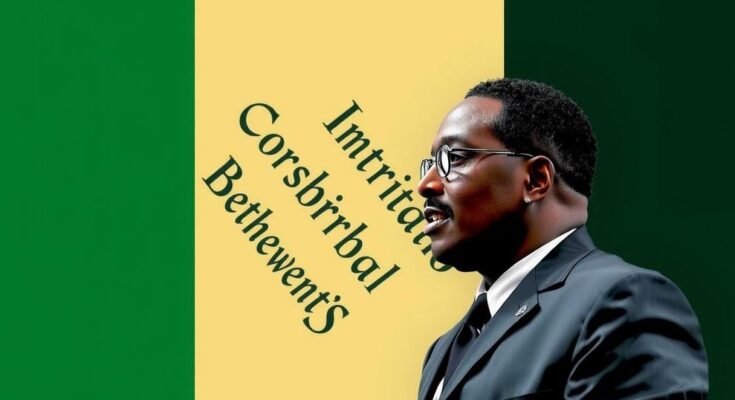Speaker Alban Bagbin dismisses claims of a constitutional crisis in Ghana, insisting that parliamentary issues can be resolved without judicial interference. The Chief Justice, however, labels the dispute over four vacant parliamentary seats as a constitutional crisis, emphasizing the urgency of resolution. The tensions reflect broader conflicts between government branches, particularly in light of upcoming elections.
In a recent statement, the Speaker of Parliament, Rt. Hon Alban Bagbin, publicly responded to concerns about a potential constitutional crisis in Ghana, asserting that no such crisis exists. This assertion follows a ruling by the Supreme Court that dismissed his attempt to overturn a prior decision barring him from declaring four parliamentary seats vacant. During an address to the media in Accra on November 6, 2024, Speaker Bagbin called for mature deliberation amongst lawmakers to resolve the impasse without further judicial intervention. He reiterated, “There’s no constitutional crisis in this country. I repeat, there’s no constitutional crisis in this country.” Furthermore, he underscored Parliament’s constitutional authority to initiate the removal of MPs who have crossed party lines or expressed intentions to contest as independents in the upcoming elections. Additionally, he accused the Executive and Judiciary of colluding to undermine the authority of Parliament amidst these developments. Chief Justice Gertrude Torkornoo, however, recently classified the parliamentary conflict involving the four disputed seats as a constitutional crisis requiring urgent action. During court proceedings on October 30, 2024, she expressed apprehension about delays in judicial processes pertaining to the matter and urged Alban Bagbin’s lawyer, Thaddeus Sory, to act promptly. She queried Sory regarding the lack of submission of necessary documents by the October 30 deadline, emphasizing, “This is a constitutional crisis; we’re living in a country where Parliament is not sitting. What is going on?” The Chief Justice mandated Sory to ensure the documentation is filed by the end of business on October 31, 2024. The Attorney General, Godfred Yeboah Dame, recommended excluding the Speaker from the case, emphasizing his office’s jurisdiction over public servants and constitutional matters. The Supreme Court later dismissed Bagbin’s application which sought to reverse the ruling that suspended his declaration of the four vacant seats. This dismissal followed an initial suit filed by the Effutu MP, Alexander Afenyo-Markin, challenging the Speaker’s actions. The Speaker’s legal team contended that the Supreme Court lacked jurisdiction in this issue, among other arguments.
The situation surrounding the parliamentary impasse in Ghana has raised concerns regarding the stability of constitutional governance. Speaker Alban Bagbin’s declarations and decisions fundamentally hinge on the interpretation of parliamentary authority versus judicial oversight. The Chief Justice’s framing of the debate as a crisis reflects broader tensions between different branches of government. The legitimacy of parliamentary processes in managing party loyalty and independent candidacies further highlights the complexities within Ghana’s political landscape, especially as the country approaches crucial electoral periods.
In conclusion, while Speaker Alban Bagbin emphatically states there is no constitutional crisis in Ghana, contrasting views from Chief Justice Gertrude Torkornoo highlight significant tensions within the parliamentary and judicial systems. The ongoing disputes regarding the vacant parliamentary seats showcase the delicate balance of power between branches of government and underscore the need for effective communication and cooperation. As the situation evolves, the implications for Ghana’s political dynamics and governance will be closely monitored.
Original Source: www.ghanaweb.com




